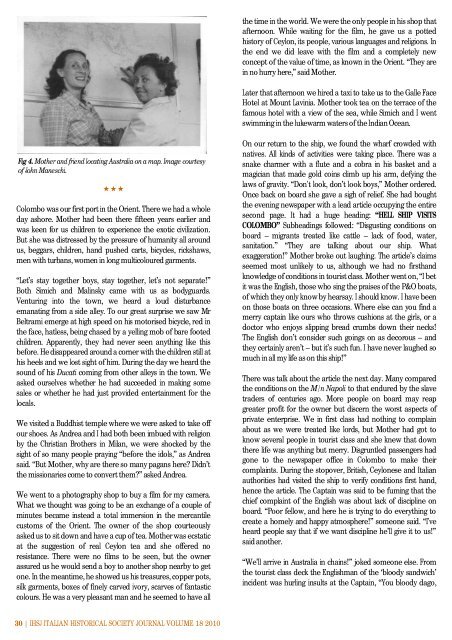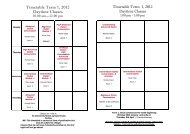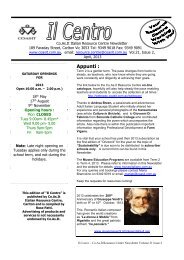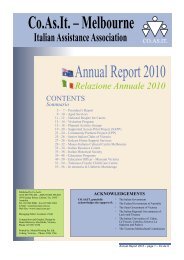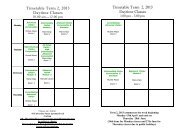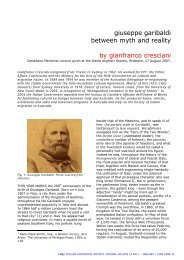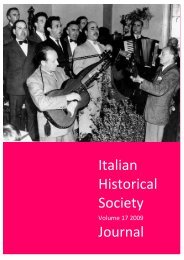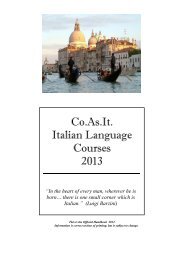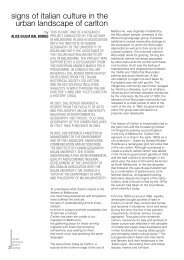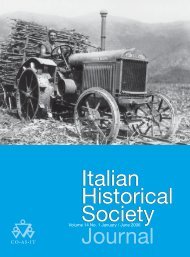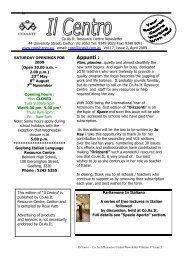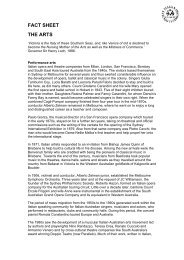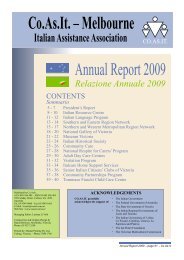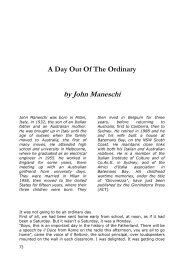January-December 2010, vol. 1
January-December 2010, vol. 1
January-December 2010, vol. 1
- No tags were found...
You also want an ePaper? Increase the reach of your titles
YUMPU automatically turns print PDFs into web optimized ePapers that Google loves.
the time in the world. We were the only people in his shop thatafternoon. While waiting for the film, he gave us a pottedhistory of Ceylon, its people, various languages and religions. Inthe end we did leave with the film and a completely newconcept of the value of time, as known in the Orient. “They arein no hurry here,” said Mother.Later that afternoon we hired a taxi to take us to the Galle FaceHotel at Mount Lavinia. Mother took tea on the terrace of thefamous hotel with a view of the sea, while Simich and I wentswimming in the lukewarm waters of the Indian Ocean.Fig 4. Mother and friend locating Australia on a map. Image courtesyof John Maneschi.Colombo was our first port in the Orient. There we had a wholeday ashore. Mother had been there fifteen years earlier andwas keen for us children to experience the exotic civilization.But she was distressed by the pressure of humanity all aroundus, beggars, children, hand pushed carts, bicycles, rickshaws,men with turbans, women in long multicoloured garments.“Let’s stay together boys, stay together, let’s not separate!”Both Simich and Malinsky came with us as bodyguards.Venturing into the town, we heard a loud disturbanceemanating from a side alley. To our great surprise we saw MrBeltrami emerge at high speed on his motorised bicycle, red inthe face, hatless, being chased by a yelling mob of bare footedchildren. Apparently, they had never seen anything like thisbefore. He disappeared around a corner with the children still athis heels and we lost sight of him. During the day we heard thesound of his Ducati coming from other alleys in the town. Weasked ourselves whether he had succeeded in making somesales or whether he had just provided entertainment for thelocals.We visited a Buddhist temple where we were asked to take offour shoes. As Andrea and I had both been imbued with religionby the Christian Brothers in Milan, we were shocked by thesight of so many people praying “before the idols,” as Andreasaid. “But Mother, why are there so many pagans here? Didn’tthe missionaries come to convert them?” asked Andrea.We went to a photography shop to buy a film for my camera.What we thought was going to be an exchange of a couple ofminutes became instead a total immersion in the mercantilecustoms of the Orient. The owner of the shop courteouslyasked us to sit down and have a cup of tea. Mother was ecstaticat the suggestion of real Ceylon tea and she offered noresistance. There were no films to be seen, but the ownerassured us he would send a boy to another shop nearby to getone. In the meantime, he showed us his treasures, copper pots,silk garments, boxes of finely carved ivory, scarves of fantasticcolours. He was a very pleasant man and he seemed to have allOn our return to the ship, we found the wharf crowded withnatives. All kinds of activities were taking place. There was asnake charmer with a flute and a cobra in his basket and amagician that made gold coins climb up his arm, defying thelaws of gravity. “Don't look, don’t look boys,” Mother ordered.Once back on board she gave a sigh of relief. She had boughtthe evening newspaper with a lead article occupying the entiresecond page. It had a huge heading: “HELL SHIP VISITSCOLOMBO” Subheadings followed: “Disgusting conditions onboard – migrants treated like cattle – lack of food, water,sanitation.” “They are talking about our ship. Whatexaggeration!” Mother broke out laughing. The article’s claimsseemed most unlikely to us, although we had no firsthandknowledge of conditions in tourist class. Mother went on, “I betit was the English, those who sing the praises of the P&O boats,of which they only know by hearsay. I should know. I have beenon those boats on three occasions. Where else can you find amerry captain like ours who throws cushions at the girls, or adoctor who enjoys slipping bread crumbs down their necks!The English don’t consider such goings on as decorous – andthey certainly aren’t – but it’s such fun. I have never laughed somuch in all my life as on this ship!”There was talk about the article the next day. Many comparedthe conditions on the M/n Napoli to that endured by the slavetraders of centuries ago. More people on board may reapgreater profit for the owner but discern the worst aspects ofprivate enterprise. We in first class had nothing to complainabout as we were treated like lords, but Mother had got toknow several people in tourist class and she knew that downthere life was anything but merry. Disgruntled passengers hadgone to the newspaper office in Colombo to make theircomplaints. During the stopover, British, Ceylonese and Italianauthorities had visited the ship to verify conditions first hand,hence the article. The Captain was said to be fuming that thechief complaint of the English was about lack of discipline onboard. “Poor fellow, and here he is trying to do everything tocreate a homely and happy atmosphere!” someone said. “I'veheard people say that if we want discipline he’ll give it to us!”said another.“We’ll arrive in Australia in chains!” joked someone else. Fromthe tourist class deck the Englishman of the ‘bloody sandwich’incident was hurling insults at the Captain, “You bloody dago,30 | IHSJ ITALIAN HISTORICAL SOCIETY JOURNAL VOLUME 18 <strong>2010</strong>


